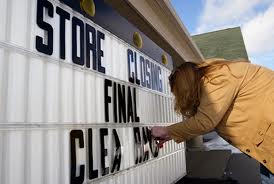
From the mega-chains to storefront hometown locations, bookstores as a whole are floundering. Some sites are even keeping a running death knell, announcing the demise of more bookstores almost every day. Borders is out, Barnes and Noble is still in negotiations with Liberty Media that are rumored to be stalled over a lack of reliable financing, and indie book stores struggle to keep up with Amazon and the digital revolution.
Some brick-and-mortar stores, however, are still thriving by adapting to the demands of a new market. Book Nook in Sylacauga, Alabama, so-named before the e-reader device of the same name, has maintained its hometown business by specializing in older collectible books, while Vroman’s, Southern California’s oldest independent bookstore, continues to attract customers coming with several author appearances a week, education classes, art exhibits, and more.
One of the best models of literary adaptation may have to be Canada’s Indigo Books, who has managed to maintain sales in the digital book age. From the start, Indigo worked with e-reader force Kobo, helping the digital leader increase sales from just over $800,000 in its first year to well over $60 million up to April of this year. Rather than fight against the trend towards e-books, Indigo embraced it, despite its origin as a print bookstore. They’ve also shifted some of the focus to encompass not just books, but toys, games, and soon, home décor.
At this year’s BookExpo America, Barnes and Noble’s Theresa Horner, VP of Digital Content, detailed how the leading brick-and-mortar book selling chain has incorporated ebooks into its in-store model. Nook owners receive special discount offers and incentives when they enter a Barnes and Noble location with their devices. In addition, Nook users can read any ebook in the entire catalog for free, as long as they are in the store; this model has taught Nook consumers that they still need the old fashioned bookstore, while translating into increased sales for B&N in products besides books.
As publishing industry executives continue to promise that print and digital will prosper side-by-side, this evolution of what consumers expect from a bookstore will continue to adapt in order to stave off extinction.
Mercy Pilkington is a Senior Editor for Good e-Reader. She is also the CEO and founder of a hybrid publishing and consulting company.
